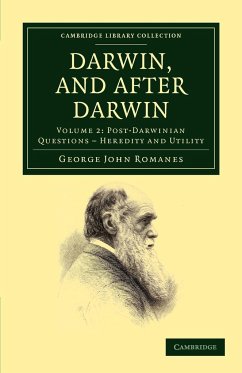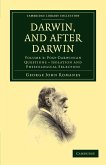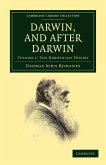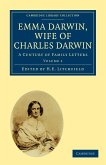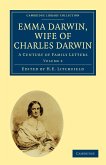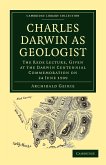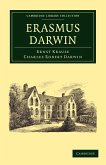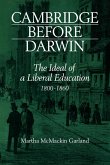George John Romanes
Darwin, and After Darwin
An Exposition of the Darwinian Theory and Discussion of Post-Darwinian Questions
George John Romanes
Darwin, and After Darwin
An Exposition of the Darwinian Theory and Discussion of Post-Darwinian Questions
- Broschiertes Buch
- Merkliste
- Auf die Merkliste
- Bewerten Bewerten
- Teilen
- Produkt teilen
- Produkterinnerung
- Produkterinnerung
Published 1893-7, this three-volume study of Darwin's work considers the many implications of evolution by natural selection.
Andere Kunden interessierten sich auch für
![Darwin, and After Darwin Darwin, and After Darwin]() George John RomanesDarwin, and After Darwin31,99 €
George John RomanesDarwin, and After Darwin31,99 €![Darwin, and After Darwin - Volume 1 Darwin, and After Darwin - Volume 1]() George John RomanesDarwin, and After Darwin - Volume 151,99 €
George John RomanesDarwin, and After Darwin - Volume 151,99 €![Emma Darwin, Wife of Charles Darwin Emma Darwin, Wife of Charles Darwin]() Emma Darwin, Wife of Charles Darwin56,99 €
Emma Darwin, Wife of Charles Darwin56,99 €![Emma Darwin, Wife of Charles Darwin Emma Darwin, Wife of Charles Darwin]() Emma Darwin, Wife of Charles Darwin56,99 €
Emma Darwin, Wife of Charles Darwin56,99 €![Charles Darwin as Geologist Charles Darwin as Geologist]() Archibald GeikieCharles Darwin as Geologist29,99 €
Archibald GeikieCharles Darwin as Geologist29,99 €![Erasmus Darwin Erasmus Darwin]() Ernst KrauseErasmus Darwin32,99 €
Ernst KrauseErasmus Darwin32,99 €![Cambridge Before Darwin Cambridge Before Darwin]() Martha McMackin GarlandCambridge Before Darwin41,99 €
Martha McMackin GarlandCambridge Before Darwin41,99 €-
-
-
Published 1893-7, this three-volume study of Darwin's work considers the many implications of evolution by natural selection.
Hinweis: Dieser Artikel kann nur an eine deutsche Lieferadresse ausgeliefert werden.
Hinweis: Dieser Artikel kann nur an eine deutsche Lieferadresse ausgeliefert werden.
Produktdetails
- Produktdetails
- Verlag: Cambridge University Press
- Seitenzahl: 362
- Erscheinungstermin: 19. September 2011
- Englisch
- Abmessung: 216mm x 140mm x 21mm
- Gewicht: 510g
- ISBN-13: 9781108038102
- ISBN-10: 1108038107
- Artikelnr.: 34448666
- Herstellerkennzeichnung
- Libri GmbH
- Europaallee 1
- 36244 Bad Hersfeld
- gpsr@libri.de
- Verlag: Cambridge University Press
- Seitenzahl: 362
- Erscheinungstermin: 19. September 2011
- Englisch
- Abmessung: 216mm x 140mm x 21mm
- Gewicht: 510g
- ISBN-13: 9781108038102
- ISBN-10: 1108038107
- Artikelnr.: 34448666
- Herstellerkennzeichnung
- Libri GmbH
- Europaallee 1
- 36244 Bad Hersfeld
- gpsr@libri.de
George John Romanes FRS was a Canadian-Scottish evolutionary biologist and physiologist who pioneered comparative psychology by proposing that humans and other animals share cognitive processes and mechanisms. He was the youngest of Charles Darwin's academic friends, and his ideas about evolution are historically significant. He is regarded to originate the phrase neo-Darwinism, which in the late 19th century was seen as a theory of evolution that concentrates on natural selection as the main evolutionary force. However, Samuel Butler used this term with a similar meaning in 1880. George Romanes was born in Kingston, Canada West, in 1848, as the youngest of three boys from a wealthy and highly developed family. His father, Rev. George Romanes (1805-1871), was a Scottish Presbyterian pastor. Two years after his birth, his parents relocated to Cornwall Terrace in London, United Kingdom, paving the way for Romanes' fruitful and long-lasting association with Charles Darwin. Romanes spent time growing up in Germany and Italy, where he became fluent in both languages. His early education was erratic, taking both in public schools and at home. He developed an early interest in poetry and music, at which he excelled.
Preface
Note
1. Introductory: the Darwinism of Darwin and of the post-Darwinian schools
2. Characters as hereditary and acquired (preliminary)
3. Characters as hereditary and acquired (continued)
4. Characters as hereditary and acquired (continued)
5. Characters as hereditary and acquired (continued)
6. Characters as hereditary and acquired (concluded)
7. Characters as adaptive and specific
8. Characters as adaptive and specific (continued)
9. Characters as adaptive and specific (continued)
10. Characters as adaptive and specific (concluded)
Summary
Appendix
Notes
Index.
Note
1. Introductory: the Darwinism of Darwin and of the post-Darwinian schools
2. Characters as hereditary and acquired (preliminary)
3. Characters as hereditary and acquired (continued)
4. Characters as hereditary and acquired (continued)
5. Characters as hereditary and acquired (continued)
6. Characters as hereditary and acquired (concluded)
7. Characters as adaptive and specific
8. Characters as adaptive and specific (continued)
9. Characters as adaptive and specific (continued)
10. Characters as adaptive and specific (concluded)
Summary
Appendix
Notes
Index.
Preface
Note
1. Introductory: the Darwinism of Darwin and of the post-Darwinian schools
2. Characters as hereditary and acquired (preliminary)
3. Characters as hereditary and acquired (continued)
4. Characters as hereditary and acquired (continued)
5. Characters as hereditary and acquired (continued)
6. Characters as hereditary and acquired (concluded)
7. Characters as adaptive and specific
8. Characters as adaptive and specific (continued)
9. Characters as adaptive and specific (continued)
10. Characters as adaptive and specific (concluded)
Summary
Appendix
Notes
Index.
Note
1. Introductory: the Darwinism of Darwin and of the post-Darwinian schools
2. Characters as hereditary and acquired (preliminary)
3. Characters as hereditary and acquired (continued)
4. Characters as hereditary and acquired (continued)
5. Characters as hereditary and acquired (continued)
6. Characters as hereditary and acquired (concluded)
7. Characters as adaptive and specific
8. Characters as adaptive and specific (continued)
9. Characters as adaptive and specific (continued)
10. Characters as adaptive and specific (concluded)
Summary
Appendix
Notes
Index.

